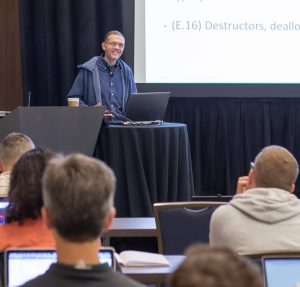Announcing Meeting C++ online!
Meeting C++ online is a series of virtual events organized by Meeting C++ for the C++ community.
Announcing Meeting C++ online!
by Jens Weller
From the article:
This year has brought a new age, and Meeting C++ will embrace this with hosting online only events in addition to the yearly conference. Its natural addition to what Meeting C++ already offers for the C++ Community. So Meeting C++ online will be a series of different virtual events organized by Meeting C++ for the C++ community.

 This year, CppCon 2020 is
This year, CppCon 2020 is  This year, CppCon 2020 is
This year, CppCon 2020 is  Will you attend?
Will you attend? This year, CppCon 2020 is
This year, CppCon 2020 is  This year, CppCon 2020 is
This year, CppCon 2020 is